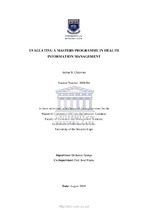| dc.description.abstract | The use of information, as well as the volume thereof, has grown extensively over time, and is, arguably, the most fundamental resource for informed decision-making in most organisations (Nath, 2017). In order to understand information, and its importance, it is necessary to understand its constructs. The terms, information and data, tend to be used randomly, as if they are interchangeable; however, they differ in context (Morabito, 2013).Data is considered unprocessed information that comprise raw facts, numbers or signals (Morabito, 2013). Data, in isolation, tends to lack meaning; however, meaning is achieved, when applied in a context, or setting (Cooper, 2016). The basic form of data is meaningless, until processed, consequently, becoming information (Bernstein, 2009). On the other hand, information is considered a construct of expressive facts, numbers, or signals, which are meaningful to people, or processed data that have contextual meanings (Morabito, 2013). Information description is more complicated in business, or organisational contexts, compared to the world’s common use of the word (Adeoti-Adekeye, 1997). It is considered abstract ideas, or products, characteristic of informing documents, reports and other similar means (Adeoti-Adekeye, 1997). It is an important strategic resource in organisations that can be used to portray organisational image, formulation of knowledge and informing decision making, or actions (Morabito, 2013). It is an essential component of almost all organisations’ activities, and failure to manage it could impact the vision, image, or operations, negatively (Morabito, 2013). | en_US |

